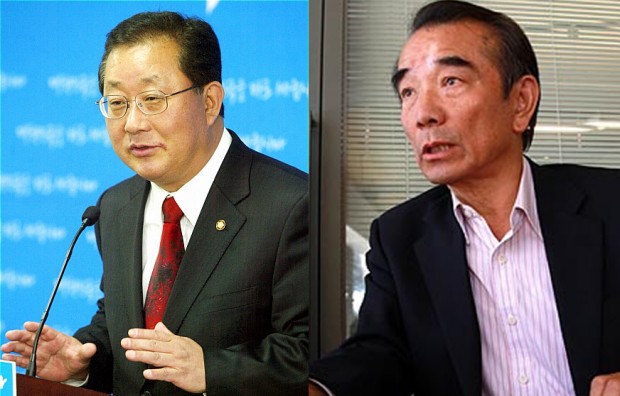South Korean broadcasting company chair nomination reveals cronyism history

Former National Assembly member Lee Chul, right, spoke out against the nomination of Kwak Sung-moon, left, as the KOBACO president. Lee's confession points to a history of cozy relations between South Korea's government and press.
By Joel Lee
The nomination of a conservative South Korean politician as the head of a public broadcast-advertising company is causing a deep-seated uproar among critics who see it as yet another government-orchestrated scheme to rein in on media control.
Kwak Sung-moon, 61, a former National Assembly and Saenuri Party representative, was nominated as the future president of the Korea Broadcast Advertising Corporation (KOBACO) by the Ministry of Strategy and Finance steering committee last Friday.
Not only is Kwak’s nomination criticized as a “parachute appointment” – referring to the age-old cronyism still rampant within Korea’s “democratic” society – the circumstances surrounding his rise to power, along with his documented troubled past, are raising red flags among those concerned with the country’s regressing press freedom.
Critics say it is the latest attempt by the power elites within the government and the ruling party to monopolize advertising revenue and pull the strings over the media.
The KOBACO was founded in 1981 by then-President Chun Doo-hwan for “securing media publicness and returning broadcast revenue to society.”
Since 2012, it became a government-funded corporation, covering terrestrial broadcasting, cable TV, satellite TV and IPTV in addition to promoting the advertising industry. It has an annual budget well over one trillion won ($1 billion).
“Kwak’s appointment is a question of social justice, a grave matter of whether Korea’s history is heading in the right direction,” former National Assembly member and Korean Railway (KORAIL) president Lee Chul, 66, said in an interview with Asia N.
Lee spoke out to the media to reveal Kwak’s controversial ascendency to power, which stretches back some four decades. In 1974, when Korea was under the military rule of former President Park Chung-hee, Lee first bore witness to Kwak’s true intentions when they were both implicated in the “Min-cheong-hak-ryun” incident.
Opportunity; Opportunism
The “Min-cheong-hak-ryun” incident refers to a series of student-led, nationwide anti-government protests that erupted in 1973 after news of kidnapping of former President Kim Dae-jung broke out across university campuses. The movement turned anti-dictatorship as it progressed; scores of “leftist” politicians, intellectuals and students demanded a democratic constitutional reform over Park’s attempt to legitimize his presidency.
Park responded by using Korea’s former ‘Central Intelligence Agency (CIA)’ – predecessor to the current National Intelligence Service (NIS) – to arrest 180 students of the “Min-cheong-hak-ryun” organization. The formal charge against them was for plotting a regime overthrow through “violent means” to establish a communist regime.
“I was preparing a reform movement in 1972 when I first met Kwak,” Lee said, noting he was looking for a suitable candidate to run the student organization. “That’s when Kwak appeared and said, ‘Brother, please make me the president. I will fight against Park’s regime until I get imprisoned.’”
“I was so naïve to believe him at that time. I told him, ‘Let’s fight on to the end together on this arduous road,’” Lee added.
Lee said after recruiting Kwak, rumors spread that Kwak was an “informer” for the CIA. Other students told Lee to keep a watchful eye on Kwak because he had “high possibilities of causing a problem.” Despite the hearsay, Lee said he tried to give Kwak the benefit of the doubt.
But Lee’s judgment would soon prove disastrous as he saw Kwak standing in a court-martial as a witness, testifying, “They said the same words as the communists!” while pointing to Lee and his colleagues. From a separate source, Lee said he heard of Kwak’s testimony – “Lee instructed me to instigate a violent communist revolution” – a point revealed by another student member in an interview with Hankyoreh newspaper.
Kwak’s “whistle-blowing” act would later win him a “specially appointed” position at Korea’s MBC broadcasting corporation as a reporter, Lee said. Based on his journalist career, where he became a company executive, Lee entered the National Assembly as a Daegu city representative in 2004 – this time too, through the ruling party nomination.
In June 2005, Kwak was involved in a drunken brawl incident where he threw beer bottles onto a restaurant wall after complaining to the present businessmen for not properly funding his party. The incident forced Kwak to resign from his office as the party chairman of public relations and municipal chief vice-chairman.
Cozy government-press relations
In a bickering tirade posted online, Lee denounced the nomination, saying his confession is not because of a personal grudge, but a “sense of historical duty to correct Korea’s contorted politics.” According to Lee, the Japanese-colonial traitors, dictatorship collaborators and informers were granted much powers and wealth at the expense of falsely accused scapegoats.
“I want to bear witness to my younger generations that true success lies in following the righteous path,” Lee said.
In an interview with Ohmynews, Lee urged Kwak to confess his past misdeeds conscientiously, so that he does not have to be a “shameful father to his son and daughter.”
The cozy relations between the government and the press have become everyday news for the Park administration. In a series of appointment failures, President Park and her government were grilled both by the media and the public.
Moon Chang-keuk, a former editorial reporter of conservative JoongAng Ilbo newspaper with a controversial rightist view, was nominated for the prime minister, only to step down under mounting pressure.
The new appointment of Seoul National University professor emeritus Lee In-ho as the chairman of KBS board of directors was equally criticized. Lee has vocally announced her support for former presidents Rhee Syng-man and Park Chung-hee through media interviews and newspaper columns.
























































